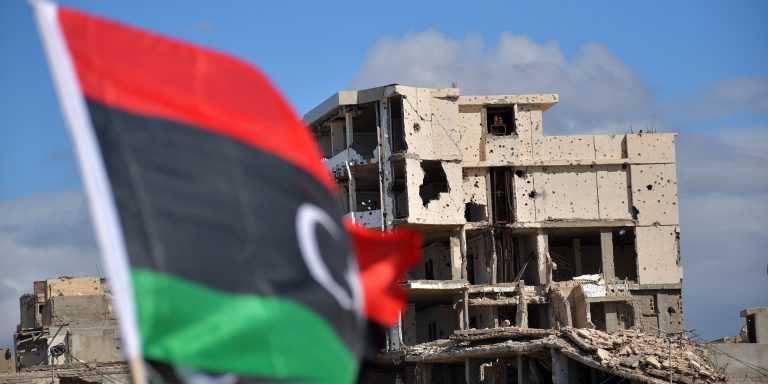INTELBRIEF
December 2, 2021
IntelBrief: Hopes Fade that Elections Will Stabilize Libya

Bottom Line up Front
- National elections, planned for December 24, might further divide Libya rather than stabilize it.
- The election rules are widely criticized and unlikely to produce a result that is viewed as fully legitimate by the Libyan population.
- Several major presidential candidates and their supporters will dispute either their exclusion from the vote or the announced results that show another candidate as winner.
- Major outside stakeholders who have intervened in Libya’s civil conflict have an interest in the outcome of the elections and eagerly anticipate the results.
The international community, as conveyed in an April 2021 United Nations Security Council resolution, called for December 24 national elections to be held in Libya to heal the decade of civil conflict that followed the fall of the regime of Col. Muammar Al Qadhafi. On September 10, following a visit to Libya to discuss the elections and related issues, Ján Kubiš, Special Envoy of the Secretary-General for Libya and Head of the United Nations Support Mission in Libya, expressed the criticality of the elections to the UN Security Council as follows: “Elections now are not just a moral or political commitment, they are a political and security necessity ensuring that the positive developments achieved in Libya since October 2020 continue and that Libya will move beyond the state of paralyzing perpetual crisis and conflict and perennial transition to complete the political process and enter the phase of building together sustainable security, stability, unity and development. The people of Libya must have the opportunity to express their will, to freely elect their representatives and give them a firm popular legitimacy.”
Yet, many observers of the processes and politics surrounding the planned December 24 national elections assess that the vote, if held on the date stipulated and under the rules and electoral laws thus far agreed, risks further dividing and destabilizing Libya. A ceasefire between forces based in eastern Libya—the Libyan National Army (LNA)—and those loyal to the UN-backed interim government based in Tripoli, has largely held since October 2020. But experts expect that ceasefire to unravel unless a national government is elected that can be viewed as a legitimate governing authority. With the election less than one month away, major questions remain unresolved. With no new consensus constitution adopted, the election law that will govern the election has been widely disputed. Among the criticisms, it provides for the president to have sweeping powers compared to that of the elected parliament—an imbalance that reduces the ability of an elected legislative body to hold the presidency accountable. With respect to the election processes, the December 24 vote will only be for the first round of the presidential election, with a runoff among the two top vote-getters (if no one achieves a majority) and the election for the parliament to take place 50 days later. The results of the runoff and the parliamentary election will be announced simultaneously—an effort to address concerns that the results of the presidential election could influence or impact the parliamentary vote. Kubis's resignation in late November, explained as paving the way for separating the role of Special Envoy from that of U.N. mission director in Libya, adds to the current uncertainty.
The presidential candidate field further complicates the election picture. Among the 98 candidates who registered on November 24, several were major figures with significant constituencies—but who are also likely to question their exclusion or any election result that does not show them as winner. Either their exclusion or announced defeat could produce civil conflict among their supporters. The final list of approved candidates will be announced the first week of December, but Libya's election commission almost immediately excluded 25 of the presidential hopefuls on various grounds, including Seif al-Islam, Qadhafi's son, for his alleged role in trying to suppress the opposition that overthrew his father. On November 26, a gunman attacked lawyers attempting to file a court appeal of the denial of his candidacy. Khalifah Haftar, head of the LNA, was not excluded immediately but his candidacy might yet be voided for alleged war crimes committed in conjunction with his failed 2019 – 2020 offensive to capture Tripoli. The head of the Tripoli-based, UN-backed Government of National Unity, Abdulhamid Dbeibah, might be excluded for refusing to step down from his post three months before the election, as was required by the election law. The speaker of the eastern-based parliament, Aguila Saleh, has also filed to run but remains tainted in the eyes of many as the drafter of the controversial election law.
Any renewed conflict after the election is certain to attract the attention of the myriad countries that have been backing the various major Libyan factions. For example, a coalition consisting of Egypt, the United Arab Emirates, Russia, and other outside actors backed Haftar's failed 2019 attempt to capture all of Libya. These countries claim Haftar is a staunch opponent of Islamist terrorist groups and Islamist parties linked to the Muslim Brotherhood, though this priority falls below several other more self-serving objectives linked to energy and geopolitics. Supporting the Tripoli-based interim government has been most of the major European powers and the United States who view UN backing as bestowing legitimacy. However, at times, the Trump administration and France engaged with Haftar as a potential anti-terrorism partner. Tripoli’s staunchest backer has been Turkey, which has supplied the unity government with drones and other key technologies that enabled it to stave off Haftar's offensive. Although the outside powers want their favored factions to prevail in the upcoming Libyan election, it is likely that all would welcome a result that is viewed as legitimate and enables them to exit the conflict entirely. The prospects for such a result, however, appear slim.